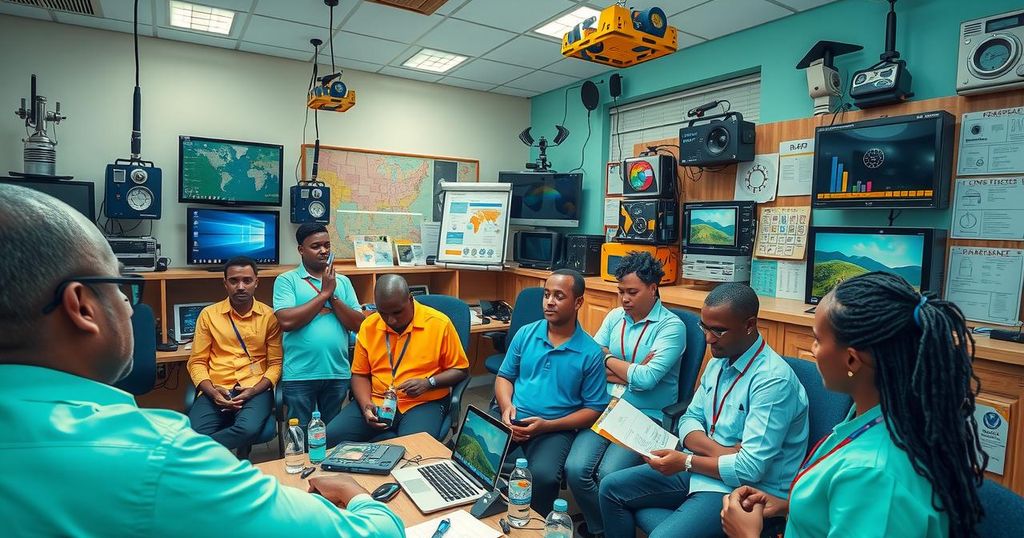Climate change
AFRICA, AFRICAN RISK CAPACITY, ANAMET, ANPC, ARC, ASIA, BOAD, CC, CLIMATE CHANGE, CREWS, EARLY WARNING, EARLY WARNING FOR ALL PARTNERS, GCF, GETI, GREEN CLIMATE FUND, IFRC, INCHEON, INFORMATION AND EARLY WARNING SYSTEMS PROJECTS, INTERNATIONAL COOPERATION, INTERNATIONAL FEDERATION OF RED CROSS AND RED CRESCENT SOCIETIES, INTERNATIONAL TELECOMMUNICATION UNION, ITU, JAPAN, KOREA, SOUTH, MERF, MINISTRY OF ENVIRONMENT AND FOREST RESOURCES, NATIONAL AGENCY FOR CIVIL PROTECTION, OFFICE FOR NORTHEAST ASIA AND GLOBAL EDUCATION AND TRAINING INSTITUTE, ONEA, PARIS AGREEMENT, REPUBLIC OF KOREA, SEND, SUSTAINABLE DEVELOPMENT, TOGO, TOGOLESE METEOROLOGICAL AGENCY, UN CLIMATE TECHNOLOGY CENTRE AND NETWORK, UNCTCN, UNDRR, UNITED NATIONS OFFICE FOR DISASTER, UNITED NATIONS OFFICE FOR DISASTER RISK REDUCTION, WEST AFRICAN DEVELOPMENT BANK, WMO, WORLD METEOROLOGICAL ORGANIZATION
Leila Ramsay
0 Comments
Empowering Togo: Strengthening Climate and Disaster Risk Management
A workshop held from April 8-11, 2025, in Incheon, Korea, empowered Togolese stakeholders to enhance climate and disaster risk management through training on project implementation tools. Key institutions participated to strengthen their capacity and coordination, culminating in a commitment to improve resilience for vulnerable communities in Togo.
From April 8 to April 11, 2025, the United Nations Office for Disaster Risk Reduction (UNDRR), in collaboration with the Green Climate Fund (GCF) and the West African Development Bank (BOAD), conducted a technical Training of Trainers workshop in Incheon, Republic of Korea. The workshop, titled “Tools for Implementing Disaster Risk Reduction, Climate Information and Early Warning Systems Projects,” aimed to empower national stakeholders from Togo, particularly in supporting the newly approved GCF co-funded project designed to enhance resilience in vulnerable communities exposed to climate risks.
Key representatives from Togo’s disaster risk management institutions, such as the National Agency for Civil Protection (ANPC) and the Togolese Meteorological Agency (ANAMET), participated in various training sessions. Notable international partners, including the World Meteorological Organization (WMO) and the International Federation of Red Cross and Red Crescent Societies (IFRC), provided insights on disaster risk reduction, climate change adaptation, and the development of multi-hazard early warning systems. Participants engaged with global frameworks like the Sendai Framework and the Paris Agreement to strengthen their understanding of project coordination and financing.
The workshop emphasized practical tools for project implementation, enabling participants to explore frameworks such as the Sendai Framework Monitor Custom Indicators and the Disaster Resilience Scorecard for Cities. Additionally, representatives from Korea’s Ministry of the Interior and Safety presented their advanced disaster management systems, underscoring the significance of utilizing modern technology and inter-agency cooperation in disaster management.
A field visit to the Incheon Metropolitan City Safety Situation Division allowed participants to observe operational systems for disaster monitoring and response. Experiences shared during this visit provided insights on effective governance and technology in disaster risk management, prompting participants to express aspirations for implementing similar systems in Togo.
The workshop concluded with reflections on lessons learned and planning for the implementation of the SAP048 project. Participants demonstrated their commitment to enhancing climate resilience and effective cooperation among national and international partners. Trained facilitators are expected to conduct additional training for national stakeholders in Togo, marking a pivotal step toward improving disaster resilience in the region.
The collaboration among UNDRR, GCF, BOAD, and other partners during the workshop was essential in bolstering Togo’s capacity for climate disaster management. Participants gained valuable knowledge from both local and global experts, which will directly influence the implementation of the SAP048 project. They expressed a strong commitment to leveraging lessons learned to enhance early warning systems and disaster risk reduction strategies in Togo, ultimately aiming to protect vulnerable communities from climate-related crises.
Original Source: www.preventionweb.net




Post Comment